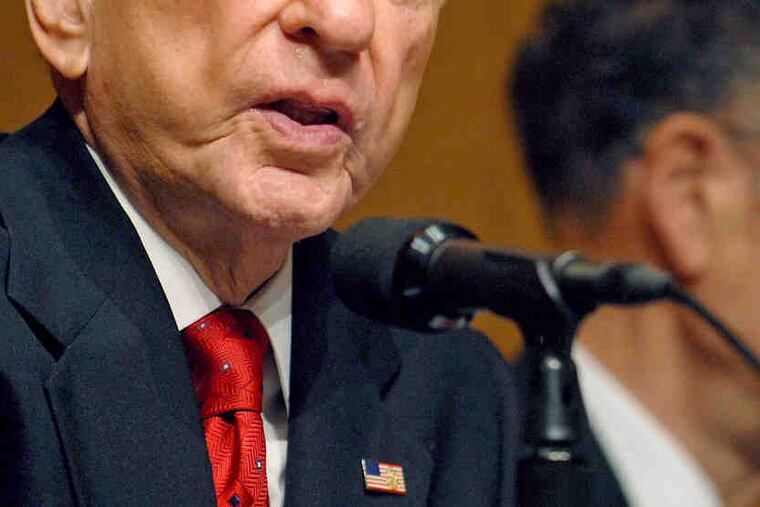Reforming the System
After The Inquirer last December spotlighted problems pervading the Philadelphia criminal-justice system, top justices of the Pennsylvania Supreme Court and newly elected District Attorney Seth Williams launched an overhaul. Here are some of the key changes.

After The Inquirer last December spotlighted problems pervading the Philadelphia criminal-justice system, top justices of the Pennsylvania Supreme Court and newly elected District Attorney Seth Williams launched an overhaul. Here are some of the key changes.
March: Task Force Named
Chief Justice Ronald D. Castille and Justice Seamus McCaffery created a 12-person task force to study ways to reform the courts.
April: Sweeping Rule Changes Imposed
The Supreme Court imposed changes designed to make sure more cases are decided on their merits. The rules gave prosecutors more time to mount cases, restricted what the high court said were "gamesmanship" tactics by the defense bar, and ordered that defendants face early hearings in absentia if they fled.
May: U.S. Marshals Deployed
After holding hearings on The Inquirer's series, U.S. Sen. Arlen Specter (D., Pa.), right, successfully pressured the U.S. Marshals Service to deploy marshals to assist Philadelphia's overwhelmed court-fugitive squad.
June: Marijuana Cases Diverted
Williams began diverting 3,000 marijuana-possession cases from the main court system, treating them only as summary offenses when small amounts of pot were involved. The new policy is expected to cut the court caseload by 5 percent.
June: Forfeited Bail Pursued
Court leaders announced a plan to go after $1 billion in forfeited bail money owed by 210,000 fugitives. The Inquirer had reported that for decades the system never went after such bail.
July: Witness-Relocation Money Increased
The state increased its aid for witness relocation in Philadelphia to $1.1 million. Along with an increase in city funding, the boost puts spending to help witnesses to record levels.
August: Special Senate Committee Named
State Sen. Stewart J. Greenleaf (R., Montgomery) named 26 members, including prosecutors, judges, and defense lawyers, to a committee to investigate the issues raised in The Inquirer's series.
October: Clerk of Quarter Sessions Abolished
Mayor Nutter and City Council abolished the Clerk of Quarter Sessions Office, after the leaders of the obscure court agency admitted it had no computerized records of who owed how much of the $1 billion in bail debt.
October: Handling of Property-Crime Cases Revamped
Castille and McCaffery backed a plan to spare victims of property crimes from testifying at early court hearings. Instead, police would take the stand on their behalf, excusing 7,000 victims yearly from court appearances.
October: Conviction Tracking Upgraded
The District Attorney's Office won a new grant to upgrade its policy and research operation, bringing to $1.1 million the new funding to permit for the first time the public reporting of conviction rates.
November: 'Zone Court' Instituted
Top judges and Williams, left, reorganized the Criminal Justice Center and the District Attorney's Office to group cases by neighborhood. They said the approach would lessen witness fear and strengthen ties to civic leaders.
2011: More Changes Sought
Prosecutors hope to win approval for grand juries that can indict for violent crimes and full Common Pleas Court trials in absentia for court absconders. Officials are also planning to expand Community Court, diverting thousands of "quality of life" misdemeanors from the main courthouse.
-- Craig R. McCoy, Nancy Phillips, and Dylan Purcell
EndText
Looking Back: A System in Crisis
In a four-part series published Dec. 13 to 16, The Inquirer portrayed a criminal-justice system in crisis, plagued by abysmal conviction rates, entrenched witness intimidation, a record number of fugitives, and an inability to decide cases on their merits.
The series, "Justice: Delayed, Dismissed, Denied," drew on an unprecedented analysis of the outcomes of 31,000 court cases filed in recent years. Here are some of the key findings:
Nearly two-thirds of defendants charged with violent crimes were escaping conviction on all charges.
Among large cities, Philadelphia had the nation's lowest felony-conviction rate.
Only 20 percent of city defendants charged with violent felonies were convicted of a felony.
Only one of every 10 people charged with assault with a gun was convicted of that charge.
Only two of every 10 accused gunpoint robbers were convicted of armed robbery.
Of the thousands of defendants yearly who beat all charges in violent-crime cases, 92 percent had their cases dismissed or dropped ahead of trial. An overwhelming share fell apart in the lower-tier Municipal Court.
At least 13 witnesses or their relatives had been killed in retaliation over the previous decade. At the same time, funding for witness relocation had been cut.
Philadelphia was tied with Newark, N.J., for having the nation's highest fugitive rate.
Philadelphia had 47,000 fugitives from court, and absconders owed taxpayers $1 billion in forfeited and uncollected bail.
And there was this - among the nation's 10 largest cities, Philadelphia had the worst rates for murder, rape, robbery, and assault in 2008. This didn't change in 2009.
- Craig R. McCoy, Nancy Phillips, and Dylan Purcell
To read The Inquirer's series, use interactive media, and read dozens of follow-up articles, go to www.philly.com/courts
EndText